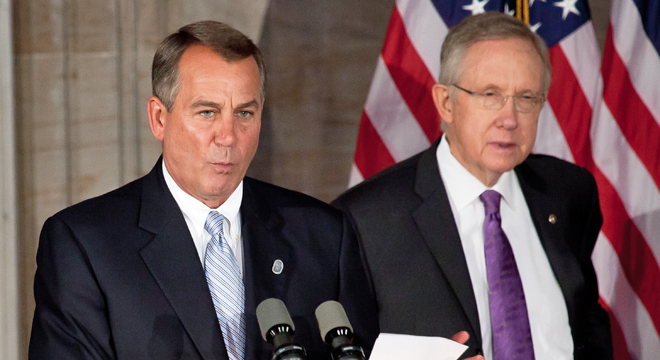By all indications, Republicans have decided to avoid another damaging debt limit fight — at least for the next couple months. The Club for Growth will not oppose the House GOP’s proposed short-term extension of the federal government’s borrowing authority. Neither will President Obama, according to White House spokesman Jay Carney.
The development raises two questions — one of immediate concern, and one regarding the longer-term implications of the GOP’s new strategy: Can the Republican bill pass as is? And, if it does, what will it mean for Obama’s second term?
The GOP bill, which will come up for a vote on the House floor Wednesday, suspends the debt limit until May 19, allowing the Treasury to borrow to meet its obligations until after Senate Democrats pass a budget. If the Senate don’t pass a budget resolution, under the terms of the bill, member pay will be withheld until they do.
Democrats aren’t wild about the notion of a short-term debt-limit extension. And on principle they don’t think Republicans should impose any partisan measures, symbolic or otherwise, as a requirement for not breaching the debt limit. House Minority Whip Steny Hoyer (D-MD) said Tuesday that the bill is “worthy of almost unrestrained derision.” Yet without Democratic help, the GOP bill will have a hard time passing in the House.
“I’m a lean no,” Rep. Justin Amash (R-MI) told reporters at a press event he and other House conservatives organized on Capitol Hill Tuesday. “I’m a lean no on everything until I’m persuaded to vote yes … But I’m open-minded.”
“Raising the debt ceiling for a budget to be named later is probably something I won’t be able to vote for,” said Rep. Tim Huelskamp (R-KS). “I have a problem with that.”
“Over the weekend I leaned yes but I’m probably back to undecided,” added Rep. Jeff Duncan (R-SC).
But let’s assume it passes smoothly tomorrow, and then without too much drama in the Senate (some Senate Democrats actually support the “no budget, no pay” provision in the House bill). What happens then?
On Sunday, Sen. Chuck Schumer (D-NY) said Democrats will turn the challenge into an opportunity.
“We’re going to do a budget this year and it’s going to have revenues in it,” Schumer said on Meet the Press. “And our Republican colleagues better get used to that fact.”
In the dry diction of budget processes, the Senate budget will include reconciliation instructions for revenue producing tax reform. The idea is that if the House and Senate pass a unified budget, a future tax reform bill would be immune to filibuster, and would have to raise revenue. But the differences between the House and Senate budgets will be enormous. And Republicans will resist any tax reform efforts that aren’t revenue neutral.
“There’s not a single Republican vote” for more revenue, said Senate Minority Leader Mitch McConnell.
Thus the end result of all this may be that Republicans will lose one of their favorite talking points — attacking Democrats for not passing a budget resolution in nearly four years — and that the already weak prospects for tax reform will be further diminished.
Additional reporting by Sahil Kapur.










